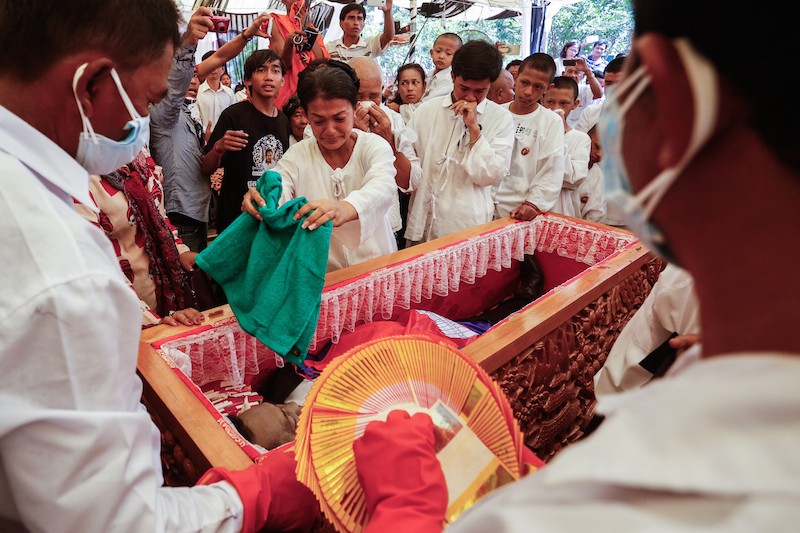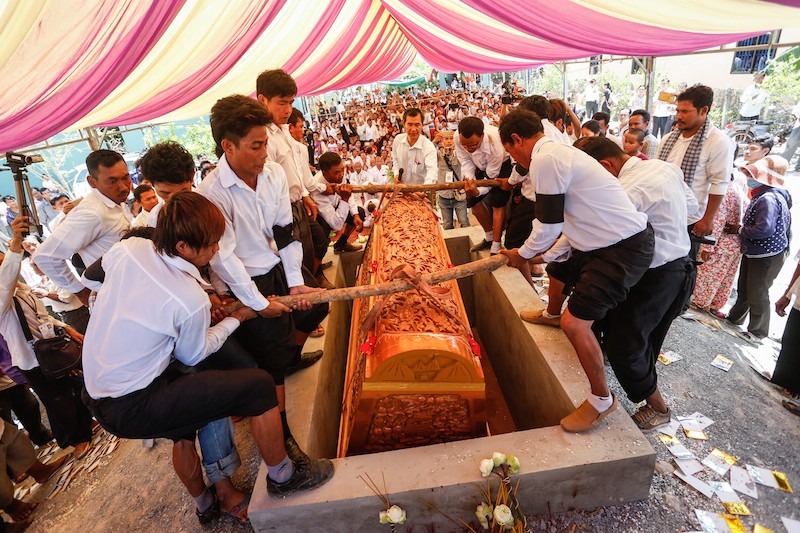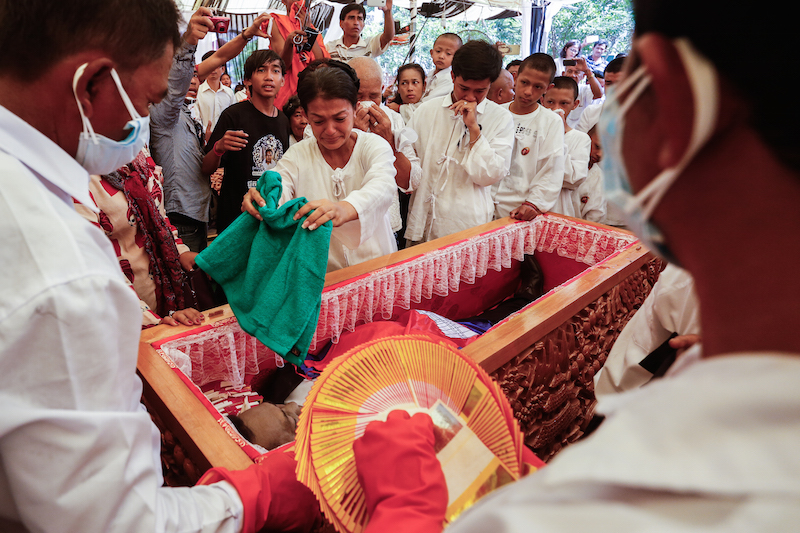Tram Kak district, Takeo province – The body of slain political analyst Kem Ley was finally laid to rest in his mother’s backyard on Monday after an elaborate ceremony that, like the previous day’s massive funeral procession, was conspicuously avoided by the country’s major television stations.
In a carefully choreographed morning service drawing heavily on Chinese customs, priests led Kem Ley’s wife and children through a succession of somber blessings as the body was placed into a florid wood coffin and lowered into a hollowed-out mound of dirt onto a bed of jasmine petals, gold leaf and Chinese characters traced in rice.

After walking around the grave three times, relatives dropped handfuls of dirt over the flag-draped casket before the rest of the mourners filled it in.
Bucking expectations of a more traditional cremation, Monday’s burial capped off a weekslong wake for the popular commentator and government critic, who, at the age of 46, was gunned down on July 10 in a brazen mid-morning attack inside the Phnom Penh convenience store where he often met with friends and colleagues over coffee.
Tens, if not hundreds, of thousands of mourners followed his body from the capital to his mother’s home in Takeo’s Angtakob village on Sunday.
The size of the crowd took Kem Ley’s 77-year-old mother, Phork Se, by surprise.
“I was moved, and I think my son died with honor, but there is no way to take it back,” she said. “Even though a lot of people came, I still miss my son.”
Although she declined to speculate about the possible motives behind her son’s murder, suspicions of a political assassination have taken hold of the national zeitgeist—and were the subtext of the public mourning. A young man’s T-shirt at Monday’s burial summed up the mood: “The world knows who killed them,” read a line of text below the faces of Kem Ley, union leader Chea Vichea and environmental activist Chut Wutty.
Like Kem Ley, the other men were outspoken critics of the ruling CPP gunned down under circumstances redolent of the government’s invisible hand.
Voice of Democracy editor Soy Visal, who had worked with Kem Ley and delivered Monday’s eulogy, said his friend’s life and death placed him among their like.
“[He] encouraged us to struggle and to understand that living without freedom is worse than dying in the fight for freedom,” he said. “[He] was ready for death for a long time, and he told the Khmer, especially the youth, to work for freedom.”
Prime Minister Hun Sen has denied any government involvement in Kem Ley’s murder, and the suspected gunman, arrested within a half hour of the shooting, claims he acted in rage over a $3,000 loan the analyst had refused to pay back.
Neither claim has gained traction with Kem Ley’s fans.
Interior Ministry spokesman Khieu Sopheak told local media on Monday that authorities were no further along in the case because the suspect was refusing to elaborate on his original confession.
But even Sok Touch, a government-aligned researcher who joined the day’s ceremonies in Takeo, said the state would have to satisfy the public’s sense of justice or face the consequences in the 2018 national election.

“If the Royal Government does not find the criminal behind it and does not give a clear explanation, the people will be the court. The people’s court happens every five years, so it needs to find the truth for the young generation,” he told reporters.
Kem Ley’s funeral procession the day before was the country’s largest since King Father Norodom Sihanouk’s in 2013, choking off two of Phnom Penh’s main thoroughfares with a sea of mourners that extended kilometers and took most of the morning to ebb out of the city.
Yet none of the country’s main TV stations covered the procession or Monday’s burial.
Their editors said they either lacked the staff, did not broadcast news on weekends as a matter of course, or simply had better things to do.
Huy Vannak, news editor for CTN and CNC, both owned by business mogul and government stalwart Kith Meng, said the stations were too busy covering other events.
“We missed the march because we didn’t have time to air the event because the TV stations were busy with concerts and boxing,” he said.
Pen Bonnar, editor-in-chief of CPP Senator Ly Yong Phat’s PNN, said the station never aired news programs on Sundays and that he did not know whether it would try to catch up.
“We won’t broadcast it if we have another event that is more important than the news about Kem Ley because we are required to broadcast what is important and what is new,” he said.
TV3 news editor Chheang Buntha said his staff did not work on Sundays and that the company did not pay overtime.
Poeu Sok, deputy news editor for Hang Meas TV, insisted that the funeral procession’s absence from his station’s programming had nothing to do with political deference.
He said the station would have aired footage of the procession on Monday but for an illness that struck his boss and forced a rescheduling, and that they chose not to cover the burial out of concern for their viewers’ feelings.
“We don’t want to broadcast the burial because people will be sad if they see the body,” he said. “And it’s the station’s policy not to air funerals except for top government officials.”




